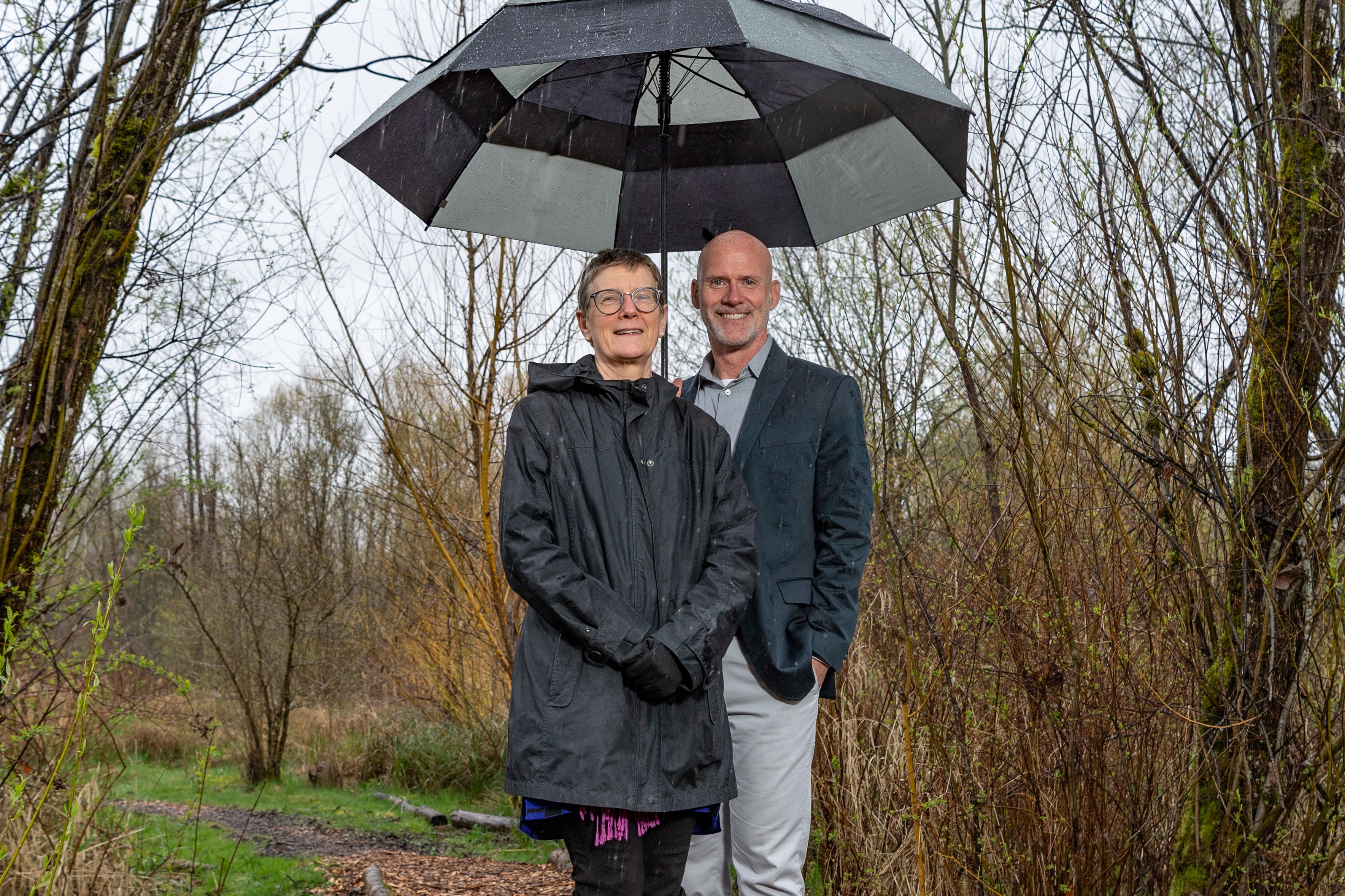Stewards of the Earth
Campus recognized for water stewardship and commitment to sustainable practices.
April 5, 2024
Campus Receives Regional Award for Sustainability
The University of Washington Bothell and Cascadia College campus has received one of the Puget Sound Business Journal’s 2024 Environmental and Sustainability Awards. The award is in the Water Stewardship category, a recognition of the campus’ deep commitment to organic land management and sustainable practices.
The campus houses the North Creek Wetland, one of the largest and most complex floodplain restorations in Washington state. It is a thriving habitat for salmon and many other animal and plant species — and creates natural filtration for stormwater run-off from the campus. Because the stormwater and run-off drain into the wetlands, the Facilities Services & Campus Operations team takes extra care to minimize pollution that enters storm drains.
“We are extremely proud that our grounds have been herbicide- and pesticide-free for more than 18 years,” said UW Bothell Chancellor Kristin G. Esterberg.
Grounds Conservation
Green lawns are a classic feature of university campuses across the nation, but keeping lawns green uses a lot of water, particularly in summer months. Therefore, lawns on the UW Bothell/Cascadia College campus go dormant over the summer to decrease water use and to promote climate action.
“Our grounds team takes great care in educating the community on why the grass looks as it does for a few months out of the year,” said Cascadia College President Eric Murray. “It’s a small price to pay for the benefits to the Earth.”
The selection of plants and vegetation is also a factor in conservation. The native and climate-adapted plants selection requires less watering because they have adapted to local conditions. Deep root systems, for example, allow them to access water far underground.
Plant placement, too, is important to the cause. The high density and layered canopy landscaping not only adds to the aesthetic but serves the dual purpose of keeping soil adequately shielded, thereby reducing evaporation.

UW Bothell Chancellor Dr. Kristin Esterberg and Cascadia President Dr. Eric Murray
Water Stewardship
In order to assess and manage the campus impact on the environment, water usage is tracked by the Facilities Services & Campus Operations team. The information is also reported on publicly accessible dashboards on TV screens across campus so that students, faculty and staff can see activity on a daily basis — and can make choices about their own practices.
Buildings feature low-flow toilets, faucets and showerheads. Operations are closely monitored, and when issues such as burst pipes arise, they can be isolated and dealt with quickly.
Facilities Services & Campus Operations has also developed an extensive stormwater management plan that outlines how to mitigate risks of water pollution. It includes public education and outreach to the campus community on the impacts of stormwater pollution as well as steps to reduce pollutants in stormwater runoff. Pollution risk from deicers and vehicle fueling and washing are addressed, too.
Valued for more than just their beauty, several rain gardens have been built into the landscape design to slow the flow of water. In these gardens, pollutants and sediments are removed from the water, naturally filtering runoff before it is released into the wetland.
Likewise, water from all stormwater drains is captured and routed through a sediment filter and oil/water separators before being discharged into the wetland.
A Sustainable Future
it’s worth noting that the campus’ stormwater system is independent of the one managed by the city of Bothell. This lessens the volume of water that the campus depends on from the city, especially as it continues to grow and develop.
As the UW Bothell/Cascadia College campus itself continues to evolve, Esterberg said we will remain committed to water stewardship and grounds practices that are beneficial for the environment — and more healthy for our entire campus community.
“Grounds maintenance is a signature component of our long-held sustainability practices,” Esterberg said. “Our grounds team includes some of the most ardent supporters and practitioners of sustainability, and I’m thrilled their work has been recognized through this award.”